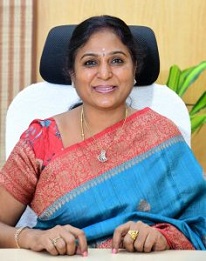 |
 |
 |
|
Dr. V. GEETHALAKSHMI Vice-Chancellor TNAU,Coimbatore-3 |
Dr. Naagula Meera Shaik Director, ATARI Zone X, Hyderabad
|
Dr.P.P.Murugan Director of Extension Education TNAU,Coimbatore-3 |
About TNAU
Tamil Nadu Agricultural University (TNAU)
The Tamil Nadu Agricultural University (TNAU) had its genesis from establishment of an Agricultural School at Saidapet, Madras, Tamil Nadu, as early as 1868 and it was later relocated at Coimbatore. In 1920, it was affiliated to Madras University. TNAU assumed full responsibilities of Agricultural Education and Research and supported the State Agricultural Department by delivering research products. Till 1946, the Agricultural College and Research Institute, Coimbatore, was the only Institute for Agricultural Education for the whole of South India. In 1958, it was recognized as a Post-graduate Centre leading to Masters and Doctoral degrees. The Agricultural College and Research Institute, Madurai was established in 1965. These two colleges formed the nucleus of the Tamil Nadu Agricultural University while it was established in 1971.
In 1972, separate degree programmes of B.Sc. (Horticulture) and B.E.(Agriculture) were started. In 1979, a separate Faculty of Horticulture was established. In 1980, B.Sc.(Home Science) programme was started at Madurai campus. The third Agricultural College was started at Killikulam in 1984 and the fourth at Kumulur (Trichy) in 1989 and later shifted to Navalur Kuttappattu (Trichy) in 1992 which is named as Anbil Dharmalingam Agricultural College and Research Institute. During 1985, B.Sc.(Forestry) programme was started at Coimbatore. Presently the B.Sc.(Horticulture) degree programme is being offered at Horticultural College and Research Institute, Periyakulam and B.Sc.(Forestry) degree programme at Forest College and Research Institute, Mettupalayam. In line with technological changes the B.E.(Agriculture) hither to offered is offered as B.Tech.(Agricultural Engineering) from the Academic year 2002-2003 at Agricultural Engineering College and Research Institute, Kumulur, Trichy. B.Sc.(Home Science) degree program is being offered at Home Science College and Research Institute, Agricultural College Campus, Madurai. Apart from these academic institutes, the University now has research programs at more than 32 stations, spread over in Tamil Nadu with more than 1200 scientists.
The global technological developments has lead to introduction of new courses. Introduction of B.Tech.(Food Process Engineering) from the academic year 1998-99, B.Tech.(Agricultural Biotechnology) and B.Tech.(Horticulture) from the academic year 2002-2003 as self supporting program has created avenues for bugetary independence. A new degree program B.Tech.(Energy and Environmental Engineering) was started during 2004 and B.Tech. (Bioinformatics) during 2006. B.Tech.(Agricultural Information Technology) and B.S.(Agribusiness Management) were started in 2007.
About ICAR
Indian Council of Agricultural Research (ICAR)
The Indian Council of Agricultural Research (ICAR) is an autonomous organisation under the Department of Agricultural Research and Education (DARE), Ministry of Agriculture and Farmers Welfare , Government of India. Formerly known as Imperial Council of Agricultural Research, it was established on 16 July 1929 as a registered society under the Societies Registration Act, 1860 in pursuance of the report of the Royal Commission on Agriculture. The ICAR has its headquarters at New Delhi. The Council is the apex body for co-ordinating, guiding and managing research and education in agriculture including horticulture, fisheries and animal sciences in the entire country. With 101 ICAR institutes and 71 agricultural universities spread across the country this is one of the largest national agricultural systems in the world. The ICAR has played a pioneering role in ushering Green Revolution and subsequent developments in agriculture in India through its research and technology development that has enabled the country to increase the production of foodgrains by 5.4 times, horticultural crops by 10.1 times, fish by 15.2 times, milk 9.7 times and eggs 48.1 times since 1951 to 2017, thus making a visible impact on the national food and nutritional security. It has played a major role in promoting excellence in higher education in agriculture. It is engaged in cutting edge areas of science and technology development and its scientists are internationally acknowledged in their fields.
